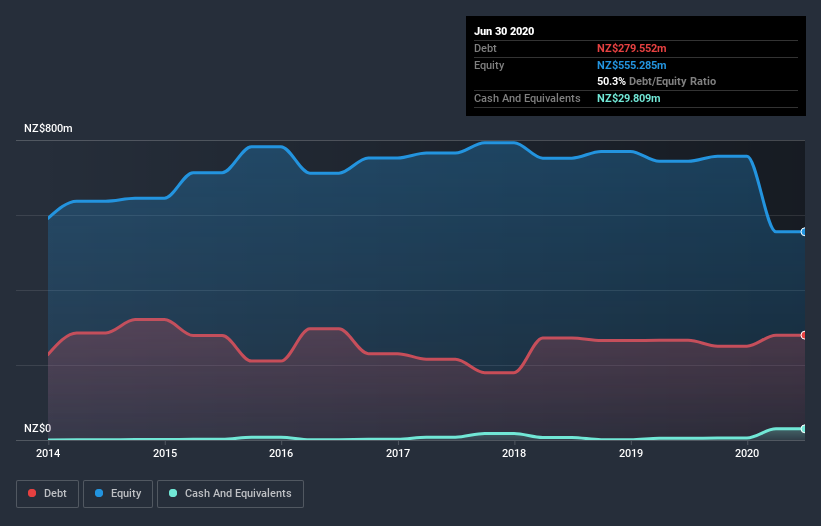- New Zealand
- /
- Oil and Gas
- /
- NZSE:CHI
Health Check: How Prudently Does New Zealand Refining (NZSE:NZR) Use Debt?
Legendary fund manager Li Lu (who Charlie Munger backed) once said, 'The biggest investment risk is not the volatility of prices, but whether you will suffer a permanent loss of capital.' So it seems the smart money knows that debt - which is usually involved in bankruptcies - is a very important factor, when you assess how risky a company is. Importantly, The New Zealand Refining Company Limited (NZSE:NZR) does carry debt. But should shareholders be worried about its use of debt?
When Is Debt A Problem?
Generally speaking, debt only becomes a real problem when a company can't easily pay it off, either by raising capital or with its own cash flow. Part and parcel of capitalism is the process of 'creative destruction' where failed businesses are mercilessly liquidated by their bankers. However, a more usual (but still expensive) situation is where a company must dilute shareholders at a cheap share price simply to get debt under control. Having said that, the most common situation is where a company manages its debt reasonably well - and to its own advantage. The first thing to do when considering how much debt a business uses is to look at its cash and debt together.
Check out our latest analysis for New Zealand Refining
What Is New Zealand Refining's Debt?
You can click the graphic below for the historical numbers, but it shows that as of June 2020 New Zealand Refining had NZ$279.6m of debt, an increase on NZ$265.8m, over one year. However, it does have NZ$29.8m in cash offsetting this, leading to net debt of about NZ$249.7m.

How Strong Is New Zealand Refining's Balance Sheet?
According to the last reported balance sheet, New Zealand Refining had liabilities of NZ$152.1m due within 12 months, and liabilities of NZ$416.7m due beyond 12 months. Offsetting these obligations, it had cash of NZ$29.8m as well as receivables valued at NZ$23.1m due within 12 months. So its liabilities outweigh the sum of its cash and (near-term) receivables by NZ$515.8m.
This deficit casts a shadow over the NZ$190.5m company, like a colossus towering over mere mortals. So we'd watch its balance sheet closely, without a doubt. After all, New Zealand Refining would likely require a major re-capitalisation if it had to pay its creditors today. The balance sheet is clearly the area to focus on when you are analysing debt. But ultimately the future profitability of the business will decide if New Zealand Refining can strengthen its balance sheet over time. So if you're focused on the future you can check out this free report showing analyst profit forecasts.
Over 12 months, New Zealand Refining made a loss at the EBIT level, and saw its revenue drop to NZ$292m, which is a fall of 24%. That makes us nervous, to say the least.
Caveat Emptor
Not only did New Zealand Refining's revenue slip over the last twelve months, but it also produced negative earnings before interest and tax (EBIT). Its EBIT loss was a whopping NZ$20m. If you consider the significant liabilities mentioned above, we are extremely wary of this investment. Of course, it may be able to improve its situation with a bit of luck and good execution. Nevertheless, we would not bet on it given that it lost NZ$179m in just last twelve months, and it doesn't have much by way of liquid assets. So while it's not wise to assume the company will fail, we do think it's risky. When analysing debt levels, the balance sheet is the obvious place to start. However, not all investment risk resides within the balance sheet - far from it. Be aware that New Zealand Refining is showing 2 warning signs in our investment analysis , you should know about...
At the end of the day, it's often better to focus on companies that are free from net debt. You can access our special list of such companies (all with a track record of profit growth). It's free.
When trading New Zealand Refining or any other investment, use the platform considered by many to be the Professional's Gateway to the Worlds Market, Interactive Brokers. You get the lowest-cost* trading on stocks, options, futures, forex, bonds and funds worldwide from a single integrated account. Promoted
New: AI Stock Screener & Alerts
Our new AI Stock Screener scans the market every day to uncover opportunities.
• Dividend Powerhouses (3%+ Yield)
• Undervalued Small Caps with Insider Buying
• High growth Tech and AI Companies
Or build your own from over 50 metrics.
This article by Simply Wall St is general in nature. It does not constitute a recommendation to buy or sell any stock, and does not take account of your objectives, or your financial situation. We aim to bring you long-term focused analysis driven by fundamental data. Note that our analysis may not factor in the latest price-sensitive company announcements or qualitative material. Simply Wall St has no position in any stocks mentioned.
*Interactive Brokers Rated Lowest Cost Broker by StockBrokers.com Annual Online Review 2020
Have feedback on this article? Concerned about the content? Get in touch with us directly. Alternatively, email editorial-team@simplywallst.com.
About NZSE:CHI
Channel Infrastructure NZ
Provides infrastructure solutions to meet fuel and energy needs in New Zealand.
Adequate balance sheet and fair value.
Market Insights
Community Narratives


Recently Updated Narratives

Constellation Energy Dividends and Growth

CoreWeave's Revenue Expected to Rocket 77.88% in 5-Year Forecast

Bisalloy Steel Group will shine with a projected profit margin increase of 12.8%
Popular Narratives


MicroVision will explode future revenue by 380.37% with a vision towards success


NVDA: Expanding AI Demand Will Drive Major Data Center Investments Through 2026



